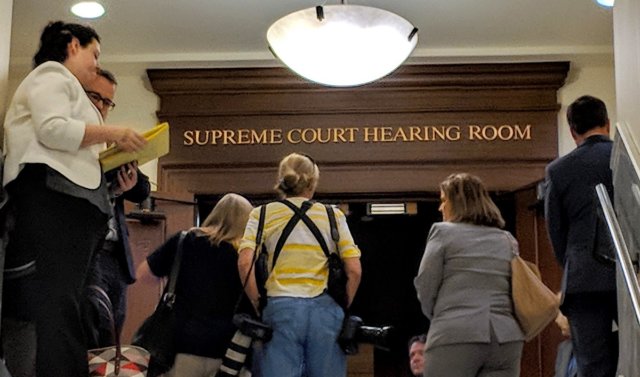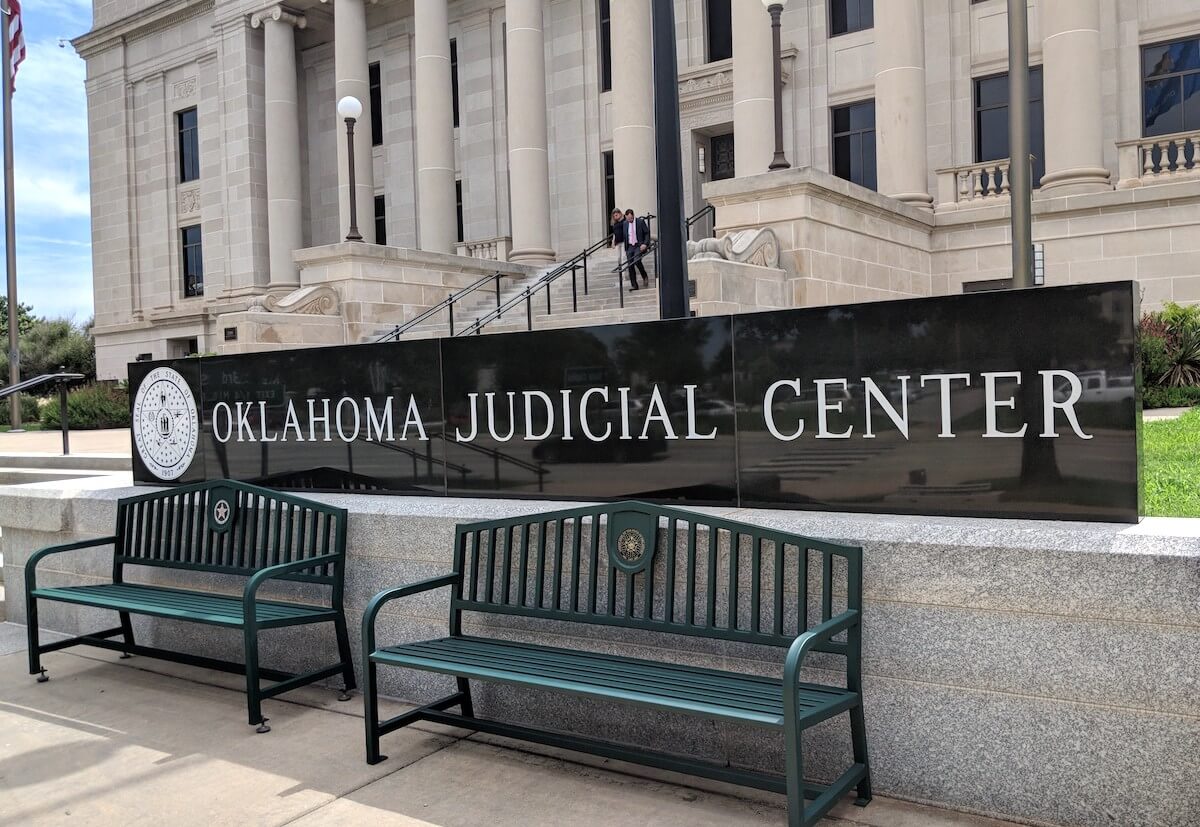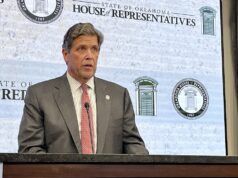

Whether proponents would get to circulate an initiative petition for the 178,000 signatures needed to place Medicaid expansion on the 2020 general election ballot in Oklahoma came down to a question of gists and digits.
The state Supreme Court heard arguments in a conservative advocacy group’s legal challenge of the proposed Medicaid expansion initiative petition at a hearing on Tuesday. Within hours, the court had issued a 6-3 opinion rejecting the challenge and clearing the way for expansion proponents to spend the summer gathering signatures.
A lawyer for the Oklahoma Counsel of Public Affairs Counsel told justices the initiative petition’s proposed short statement published at the top of voter signature pages — what Oklahoma law calls the “gist” of the proposition — was inaccurate and would mislead those asked to sign it.
He said the gist purported to expand Medicaid to persons with income at or below 133 percent of the federal poverty level, when the Affordable Care Act instead requires expansion to cover persons up to 138 percent of the federal poverty level.
“This factual inaccuracy dooms the petition,” attorney Travis Jett, representing the OCPA, told the court.
But in an opinion written by Chief Justice Noma Gurich later in the afternoon (embedded below), the court said the gist clearly stated what the proposed amendment intended to do: “… expand Oklahoma’s Medicaid program to include certain low-income adults between the ages of 18 and 65 whose income does not exceed 133 percent of the federal poverty level as permitted under the federal Medicaid laws.”
The gist issue was one of several debated by lawyers for and against the initiative petition Tuesday. A member of the Attorney General’s Office also weighed in on the legality of the state question. Solicitor General Mithun Mansinghani told justices that the petition’s “gist” was in error, but proponents of the petition could be ordered to re-draft it and still have time to make the November 2020 election date as State Question 802.
Justice Douglas Combs said he wondered whether the whole issue was over one digit: a “3” or an “8”.
Jett told the court the problem was more than that, contending the proposed amendment to the Oklahoma Constitution violated existing state and federal constitutions because it delegated the state Legislature’s authority to the federal government. The court’s opinion also denied those arguments.
‘Parade of horribles’
Opponents contended the proposed amendment would allow federal bureaucrats, who determine federal poverty level calculations, to effectively determine Medicaid expansion eligibility and also control the state’s financial obligation. Supporters said the eligibility for traditional Medicaid is already determined by federal law, but expansion would be the Oklahoma voters’ desire to provide coverage for low-income persons ineligible for traditional Medicaid or Affordable Care Act subsidies.
Under the Affordable Care Act 90 percent of the Medicaid expansion is paid by the federal government while 10 percent is matched by the states.
Echoing stated concerns from Gov. Kevin Stitt and other state Republican leaders, Jett warned that Congress could lower the federal contribution, sticking the state of Oklahoma with paying more for Medicaid and creating a budget crisis which legislators would be powerless to address. He said this transfer of authority to the federal government would threaten the state’s existence as a republic because it takes control of state spending away from its elected state representatives. As a result, he called the proposal unconstitutional.
Melanie Wilson Rughani, an attorney for the petition’s proponents, scoffed at Jett’s argument, calling it a “parade of horribles.”
“We are not creating one branch of government. We are not declaring martial law,” Rughani said.
She said if Congress were to cut its contribution to Medicaid as Jett argued, then the state could simply repeal the proposed state constitutional amendment or opt out of the program entirely.
Rughani said Medicaid is a cooperative federal-state program already governed by federal law and that eligibility is already based on a person’s income relative to the federal poverty level. She said the proposal does not delegate authority to the federal government but rather delegates it to voters who may want more uninsured citizens to have health care under an expanded Medicaid.

Gurich: ‘We already have Medicaid’
The case was heard by a Supreme Court patched up by four special appointments owing to two vacancies on the court and the recusals of Justices Tom Colbert and James Edmondson.
One of those appointments, Special Justice Thomas Thornbrugh, said he was unconvinced with OCPA’s argument that the petition was an unconstitutional transfer to the federal government because 36 other states had already expanded Medicaid.
“Did anyone let them know?” Thornbrugh asked Jett.
Jett said the difference here is that the Oklahoma petition is for a state constitutional amendment and not a statute, which had occurred in the other states. He said this made the Oklahoma measure unique and that it mandated a transfer of authority to Congress and federal agencies.
Thornbrugh said he understood why proponents are offering a constitutional amendment to expand Medicaid rather than a state statute in order to avoid “the mischief” of a Legislature that might change the law after the election.
Gurich, the chief justice, also made clear during the hearing that she doubted OCPA’s constitutional arguments.
“We already have Medicaid,” she said. “So if we just add a few more people along the way, that doesn’t change the picture.”
Although the constitutional argument was a significant part of OCPA’s challenge, more attention at the hearing on Tuesday was placed on whether the “gist” language was legally adequate.
The “gist” of the proposition states, in part:
This measure adds a new Article to the Oklahoma Constitution, which would expand Oklahoma’s Medicaid program to include certain low-income adults between the ages of 18 and 65 whose income does not exceed 133% of the federal poverty level, as permitted under the federal Medicaid laws.
Opponents of the petition said the percentage is more accurately an effective 138 percent, because other parts of the act add a 5 percent “income disregard.”
Rughani said the Affordable Care Act’s income calculation provisions are complex. She said the act expressly requires the expansion to cover adults with incomes up to 133 percent of the poverty level, while other parts of the ACA do establish a 5 percent income disregard. But she said the gist of the proposal tracks the ACA and mirrors other similar laws enacted by states which previously expanded Medicaid.
Rughani said the gist need only inform signers of what the proposed amendment intends to do, which is expand Medicaid to low income adults as permitted by federal law.
Justice Gurich showed signs during the hearing that the 133 percent vs. 138 percent gist question was not fatal to the petition — making a statement that drew chuckles from some of the 60 people watching from the Supreme Court gallery.
“If a regular person picks up the (federal) statute, they are not going to find 138 — 138 is in a Misfits song, but it’s not in the act,” Gurich said.
Former Justice John Reif, appointed as a special justice, questioned whether any persons signing or voting on the measure would act differently if the gist said 138 rather than 133 percent.
But Jett argued the gist language was false and risks misleading would-be signors of the petition.
“This would be a monumental policy change for the state of Oklahoma, and people have a right to know what they are signing,” Jett argued.
That issue — whether the description at the top of pages voters will be presented to sign is misleading or not — was the one justices Richard Darby and Yvonne Kauger called important.
Darby said voters might need to be informed of the financial obligation that passage of the amendment would bring.
But Kauger said the gist should simply be letting voters know their vote would expand the Medicaid program.
“Aren’t they really voting on whether Medicaid is going to be expanded to more poor people in Oklahoma?” she asked.
SQ 802 PAC: Voters deserve say
Following the hearing, a spokesperson for Oklahomans Decide Healthcare, a political action committee supporting SQ 802 and Medicaid expansion, issued a statement saying that opponents’ arguments show they don’t think they can win at the polls.
“What you see here is a deliberate effort to deny Oklahoma voters from having a say and to slow the momentum behind our campaign to help save rural hospitals and to make affordable health care a reality for nearly 200,000 Oklahomans. It will not work,” said Amber England.
England’s prediction proved correct. Soon thereafter, the court issued its opinion rejecting OCPA’s protest and opening the door for proponents to obtain the necessary signatures to get the measure on the ballot.
Gurich wrote the two-page order denying the protest (embedded below). Justices Darby and Kauger — and special justices Thornbrugh, Reif and Barbara Swinton — joined in the majority opinion. Justice Combs, joined by Justice James Winchester and Special Justice Robert Bell, concurred that the constitutional challenges were meritless, but dissented on the grounds the 133 percent quoted in the gist was misleading to signatories. They said the petition should be stricken.
Other supporters of the initiative petition include the Oklahoma State Medical Association, the Oklahoma Hospital Association, the Oklahoma Nurses Association and the Saint Francis Health System. Lawyers for those organizations filed an amicus brief with the Supreme Court but did not participate in the hearing.
Those entities told the court in their brief that six Oklahoma hospitals have closed since 2010 and that another 17 rural hospitals in the state are at high risk of closing. The brief quoted studies which have showed Medicaid expansion in other states has significantly improved the financial condition of hospitals, particularly rural facilities.
“It’s been an incredible week,” Patti Davis, president of the Oklahoma Hospital Association said in a statement issued Tuesday afternoon. “We are pleased by such a swift decision from the Supreme Court and we are going to utilize every bit of this momentum to help deliver affordable healthcare to nearly 200,000 Oklahomans and to help save our rural hospitals.”
Oklahoma Supreme Court SQ 802 order
https://nondoc.com/wp-content/uploads/2019/06/SQ-802-Supreme-Court-order.pdf” height=”450px” download=”all”]




















